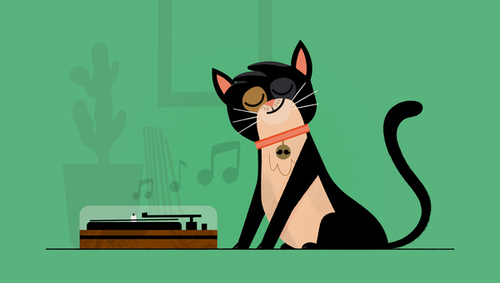
Many of us will flick on the radio in the hope that the noise might help keep our cat company when we go out. Online, you can watch videos of cats enjoying everything from piano to reggae music, and there's even an app which offers music for cats with separation anxiety. But do cats actually like music?
Cats music research
The latest research suggests that while cats might like music, they don't care much for human tunes, and respond better to 'species-appropriate' songs with frequencies and tempos that mimic the sounds of purring and birds.
'Cats' senses work very differently to human ones, so it's understandable that the music they'd find appealing would be vastly different to what we like,' says Rosie Bescoby, a pet behaviourist and member of the Association of Pet Behaviour Counsellors.
The trick for getting pets to listen is by composing music that fits into how the animal communicates, according to a study at the University of Wisconsin published in the Applied Animal Behaviour Science journal.
Researchers in this study enlisted the help of David Teie, a cat-loving cellist and music composer, who analysed the hearing ranges of cats and the sounds they enjoy. He sent the finished music to scientists to test on a group of 47 domestic cats.
'We looked at the natural vocalisations of cats and matched our music to the same frequency range, which is about an octave higher than human voices,' explains Professor Charles Snowdon, lead author of the study. 'The team incorporated tempos that they thought cats would find interesting, such as purring in one piece and suckling in another,' he says. As cats use lots of sliding frequencies in their calls, the cat music had more sliding notes than human music.
When they played the finished music, an amazing thing happened - the cats headed straight to the speakers, rubbing up against them, purring and turning their heads towards where the sound was coming from. 'The cats were far more interested in the cat music than the human variety,' says Snowdon. 'Since then, people who've adopted abused and abandoned cats have told us this music has helped the animals interact with them. This could be due to the music reducing the cats' stress levels and allowing for easier handling.'
'I've never seen the cats react like that to music'
Over at Mayhew, an animal home in Kensal Green, London, the radio is always on for the animals. Usually it's Classic FM, but in an experiment for Petplan, volunteers agreed to give David's album, Music for Cats, a whirl - and the results were astonishing.
'We have around 40 cats at the moment,' says Kayleigh Kilcommons, Head of Cattery. 'We usually play classical music in the entrance hall and throughout the centre as we've always thought it relaxes them.'
Kayleigh downloaded the album to her phone and put a wireless speaker into the cabins of several cats. The album has five cat-friendly compositions, created using combinations of electronic sounds and classical music.
Ten-month-old Leo and 11-month-old Auburn were both instantly curious - their ears started twitching, they began rubbing against the speaker and started purring during the track 'Mimi's Mewiscal', especially when the birdsong came on.
Older cat Tommy, aged 10 years old, went to explore where the music was coming from and then began nuzzling the speaker, before lying beside it during another track, 'Lolo's Air'. Many of the other cats also behaved in a similar way.
Kayleigh says: 'I've never seen our cats react like that to music before. We'll definitely be playing it from now on, instead of the classical music. Keeping cats calm and happy is one of our main purposes in looking after them while we find them new homes. If this is the way to do it then it'll become an essential part of our routine.'
Cat music found to lower stress levels
Research into the cat music phenomenon is happening all over the globe. The latest study at Louisiana State University School of Veterinary Medicine, published in the February 2019 issue of the Journal of Feline Medicine and Surgery, concludes: 'Cat-specific music can significantly lower stress-related behaviours in cats visiting the veterinary clinic.'
Meanwhile, sales of David's album- the first released by a major record label (Universal) specifically for cats - have reached 25,000, with plenty more people downloading and streaming the music via Spotify, YouTube and iTunes.
'There is other animal relaxation music out there, but it's all human music that has been repackaged,' David says. 'Cats have had to listen to human music their whole life - but this music is something that is finally on their wavelength. I've had so much positive feedback from customers that now I'm exploring something similar for dogs.'
Cats respond to familiar sounds
'Soothing sounds for pets have been around for a while but have had no scientific evidence to back them up until now,' says Rosie. 'Cats have incredibly tuned senses and are far more sensitive to sound than we are - a deaf cat can pick up on vibrations in the air through its whiskers.
'The researchers have tapped into this, and into how cats respond to certain sounds. A kitten's first comfort sound for instance is likely to be her mother's purr and the world around them.
'So, when cats are played music that has feline-appropriate tone, pitch and tempo, they show signs of enjoyment, like rubbing up against a speaker. Cats do this to transfer their scent and it generally means they like something.'
If research continues, we could find a whole new range of cat music to play to our beloved pets, enriching their experience of the world, providing mental stimulation and helping them to de-stress.
Let us know how your cat responds to this music on social media, using #PethoodStories
If you're going to be trying this out, we'd love to see how your cat responds. Simply share their reaction on social media, using #PethoodStories
